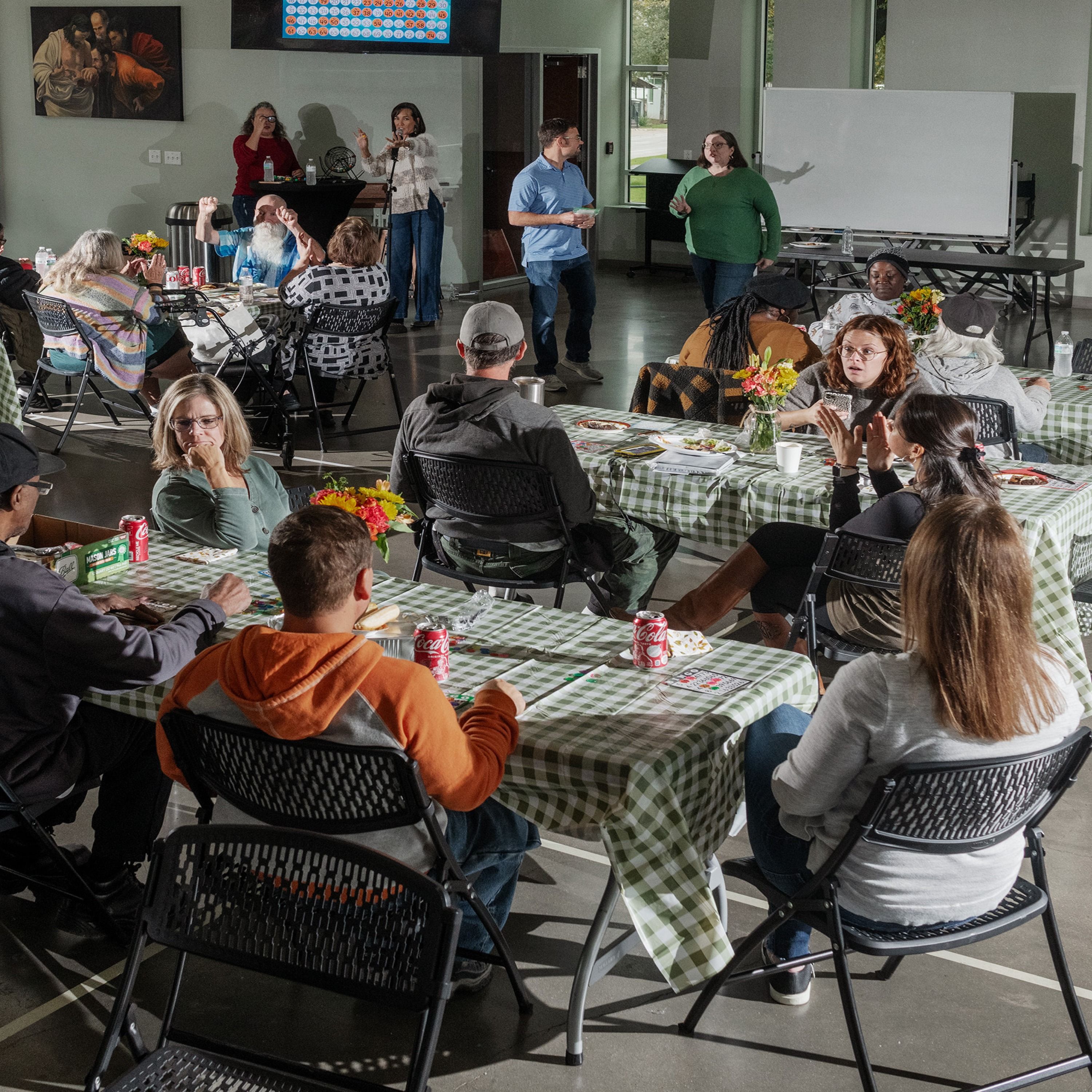Episodes
-
On Sunday, after a fire that many feared would destroy it, and a swift renovation that defied all predictions, the Cathedral of Notre-Dame reopened to the public.
Michael Kimmelman, the chief architecture critic at The Times, tells the story of the miracle on the Seine.
Guest: Michael Kimmelman, the architecture critic of The New York Times and the founder and editor-at-large of Headway.
Background reading:
Critic’s Notebook: Notre-Dame’s astonishing rebirth from the ashes.The rebuilding took about 250 companies, 2,000 workers, about $900 million, a tight deadline and a lot of national pride.See photos from the reopening.For more information on today’s episode, visit nytimes.com/thedaily. Transcripts of each episode will be made available by the next workday.
Unlock full access to New York Times podcasts and explore everything from politics to pop culture. Subscribe today at nytimes.com/podcasts or on Apple Podcasts and Spotify.
-
Last week, the chief executive of UnitedHealthcare was shot and killed in Manhattan. A five-day search for the gunman ensued.
On Monday, a 26-year-old suspect, Luigi Mangione, was arrested in Pennsylvania after an employee at a McDonald’s recognized him and called the police.
Dionne Searcey, who covers wealth and corporations, and Maria Cramer, a crime reporter in New York City, break down what we know about the suspect, and what the case has revealed about many Americans’ contempt for insurance companies.
Guest:
Dionne Searcey, a reporter for The New York Times writing about how the choices made by people and corporations affect the future of our planet.Maria Cramer, a reporter for The New York Times covering the New York Police Department and crime in the city and surrounding areas.Background reading:
The suspect was an Ivy League tech graduate from a prominent Maryland family who in recent months had suffered physical and psychological pain.A visual timeline of the UnitedHealthcare C.E.O. shooting.For more information on today’s episode, visit nytimes.com/thedaily. Transcripts of each episode will be made available by the next workday.
Unlock full access to New York Times podcasts and explore everything from politics to pop culture. Subscribe today at nytimes.com/podcasts or on Apple Podcasts and Spotify.
-
Missing episodes?
-
Syria has been controlled by one family for more than half a century who ruled by repression, devastation and violence.
But about two weeks ago, the regime began to falter, and then over the course of one night, it collapsed.
Carlotta Gall, a senior correspondent for The New York Times, discusses the fall of Bashar al-Assad and what comes next.
Guest: Carlotta Gall, a senior correspondent for The New York Times, focusing on the human aspect of wars and civil strife.
Background reading:
Live updates: The rebels who toppled Assad face stark challenges in Syria.With Assad gone, a brutal dictatorship ends. But the new risks are huge.For more information on today’s episode, visit nytimes.com/thedaily. Transcripts of each episode will be made available by the next workday.
Unlock full access to New York Times podcasts and explore everything from politics to pop culture. Subscribe today at nytimes.com/podcasts or on Apple Podcasts and Spotify.
-
The host of the “Call Her Daddy” podcast and founder of the Unwell Network discusses her interview with Vice President Kamala Harris ahead of the 2024 election, her podcast’s journey from chatting about sex advice to delving into more serious subjects and how the Unwell Network’s fan merchandise became a eight-figure business.
“I don’t care if people consider me a journalist or a podcaster, or just a girl that talks online every week.”
This interview was with Andrew Ross Sorkin of The New York Times at the annual DealBook Summit and recorded live in front of an audience at Jazz at Lincoln Center. Read more about highlights from the day at https://www.nytimes.com/live/2024/12/04/business/dealbook-summit-news
Unlock full access to New York Times podcasts and explore everything from politics to pop culture. Subscribe today at nytimes.com/podcasts or on Apple Podcasts and Spotify.
Unlock full access to New York Times podcasts and explore everything from politics to pop culture. Subscribe today at nytimes.com/podcasts or on Apple Podcasts and Spotify.
-
The Academy Award-winning actress discusses her lifelong quest for connection, humanity’s innate goodness and the point of being alive.Unlock full access to New York Times podcasts and explore everything
from politics to pop culture. Subscribe today at nytimes.com/podcasts or
on Apple Podcasts and Spotify. -
Warning: this episode contains strong language.
In Austin, Texas, a local businessman has undertaken one of the nation’s biggest and boldest efforts to confront the crisis of chronic homelessness.
Lucy Tompkins, a national reporter for The Times, takes us inside the multimillion-dollar experiment, to understand its promise and peril.
Guest: Lucy Tompkins, who reports on national news for The New York Times.
Background reading:
Can a big village full of tiny homes ease homelessness in Austin?For more information on today’s episode, visit nytimes.com/thedaily. Transcripts of each episode will be made available by the next workday.
Unlock full access to New York Times podcasts and explore everything from politics to pop culture. Subscribe today at nytimes.com/podcasts or on Apple Podcasts and Spotify.
-
On Wednesday, the Supreme Court heard a major case on the rights of transgender children that could help uphold or dismantle dozens of laws across the country.
Adam Liptak, who covers the Supreme Court for The Times, explains how the questioning played out and how the justices are likely to rule.
Guest: Adam Liptak, who covers the Supreme Court and writes Sidebar, a column on legal developments, for The New York Times.
Background reading:
The justices heard arguments on Wednesday over whether Tennessee can ban some medical treatments for transgender youth.For families of transgender children, Tennessee’s ban forces hard choices.For more information on today’s episode, visit nytimes.com/thedaily. Transcripts of each episode will be made available by the next workday.
Unlock full access to New York Times podcasts and explore everything from politics to pop culture. Subscribe today at nytimes.com/podcasts or on Apple Podcasts and Spotify.
-
Elon Musk and Vivek Ramaswamy have called the federal bureaucracy an “existential threat to our republic.” Now, President-elect Donald J. Trump is empowering them to drastically shrink it, by whatever means necessary.
David A. Fahrenthold, an investigative reporter for The New York Times, discusses their plans — and what it would look like if they were actually carried out.
Guest: David A. Fahrenthold, an investigative reporter for The New York Times.
Background reading:
The so-called Department of Government Efficiency has advantages that past budget cutters did not, but laws and court challenges could still make change slow and difficult.For more information on today’s episode, visit nytimes.com/thedaily. Transcripts of each episode will be made available by the next workday.
Unlock full access to New York Times podcasts and explore everything from politics to pop culture. Subscribe today at nytimes.com/podcasts or on Apple Podcasts and Spotify.
-
President Biden went back on his word by pardoning his son Hunter Biden. His stated rationale for granting the pardon will inevitably muddy the political waters as President-elect Donald J. Trump prepares to take office with plans to use the Justice Department and the F.B.I. to pursue “retribution” against his political adversaries.
Peter Baker, chief White House correspondent, discusses where Mr. Biden’s decision leaves the U.S. justice system.Guest: Peter Baker, chief White House correspondent for The New York Times.
Background reading:
Mr. Biden and Mr. Trump now agree on one thing: The Biden Justice Department has been politicized.Mr. Biden is facing criticism for absolving his son after insisting he would not.For more information on today’s episode, visit nytimes.com/thedaily. Transcripts of each episode will be made available by the next workday.
Unlock full access to New York Times podcasts and explore everything from politics to pop culture. Subscribe today at nytimes.com/podcasts or on Apple Podcasts and Spotify.
-
Weeks before taking office, President-elect Donald J. Trump is doubling down on tariffs. Even if the threat to impose them proves to be just a negotiating tactic or bluster, it is also a gambit that has immediate consequences.
Ana Swanson, who covers trade for The Times, discusses whether tariffs worked in Mr. Trump’s first term and how they compare with the alternative approach used by President Biden.
Background reading:
Mr. Trump’s threat to wield tariffs is already rocking business and diplomatic relationships.The president-elect picked Jamieson Greer, a lawyer and former Trump official, to serve as top trade negotiator, a position that will be crucial to Mr. Trump’s plans of rewriting the rules of trade in America’s favor.For more information on today’s episode, visit nytimes.com/thedaily. Transcripts of each episode will be made available by the next workday.
Unlock full access to New York Times podcasts and explore everything from politics to pop culture. Subscribe today at nytimes.com/podcasts or on Apple Podcasts and Spotify.
-
Most of the deals you’ll see for Black Friday and Cyber Week aren’t worth your time. This week, we reveal how to actually get a deal that’s worth your money.
To listen to more episodes, please search for The Wirecutter Show wherever you get your podcasts.
Unlock full access to New York Times podcasts and explore everything from politics to pop culture. Subscribe today at nytimes.com/podcasts or on Apple Podcasts and Spotify.
-
Leading up to Thanksgiving, we took a trip to the home of Ina Garten, the legendary cookbook author and TV star. For one glorious afternoon, the Barefoot Contessa gave us a master class on the art of hosting. She answered our questions big and small — seating arrangements, whether to have bread at the table, what to do with that difficult relative, how to zest correctly. Plus, she walked us through two of her signature recipes, which you can enjoy this holiday.
For photos and recipes from our visit with Ina Garten, visit nytimes.com/thedaily. Transcripts of each episode will be made available by the next workday.
Unlock full access to New York Times podcasts and explore everything from politics to pop culture. Subscribe today at nytimes.com/podcasts or on Apple Podcasts and Spotify.
-
Overnight, Israel agreed to a cease-fire with the Lebanese armed group Hezbollah — a major turning point in one of the wars the country has been fighting since Hamas attacked it on Oct. 7. But the war in Gaza shows no sign of ending, and Israel’s conduct there is coming under increased scrutiny.
A New York Times investigation has examined one controversial tactic: the Israeli use of Palestinian detainees as human shields.
Natan Odenheimer, a contributing reporter for The Times, explains what the investigation revealed, and what the tactic says about the nature of the conflict.
Guest: Natan Odenheimer, a contributing reporter for The New York Times.
Background reading:
A Times investigation found that Israeli soldiers and intelligence agents, throughout the war in Gaza, have regularly forced captured Palestinians to conduct life-threatening reconnaissance missions to avoid putting Israeli soldiers at risk on the battlefield.As the cease-fire in Lebanon takes effect, follow live updates.Unlock full access to New York Times podcasts and explore everything from politics to pop culture. Subscribe today at nytimes.com/podcasts or on Apple Podcasts and Spotify.
-
Now that Matt Gaetz has withdrawn from consideration as attorney general, President-elect Donald J. Trump’s most controversial cabinet pick is his selection of Pete Hegseth as secretary of defense.
Dave Philipps, who reports on war and the military for The Times, discusses three major deployments that shaped how Mr. Hegseth views the military — and why, if confirmed, he’s so dead-set on disrupting its leadership.
Guest: Dave Philipps, who reports about war, the military and veterans for The New York Times.
Background reading:
His military experiences transformed Mr. Hegseth from a critic of war crimes into a defender of the accused.What to know about Mr. Hegseth, Trump’s pick for defense secretary.For more information on today’s episode, visit nytimes.com/thedaily. Transcripts of each episode will be made available by the next workday.
Unlock full access to New York Times podcasts and explore everything from politics to pop culture. Subscribe today at nytimes.com/podcasts or on Apple Podcasts and Spotify.
-
President-elect Donald J. Trump has promised a radically different approach to foreign policy from that of the Biden administration. In Ukraine, he has pledged to end the war in a day.
But just weeks before he’s set to take office, the war has taken an unexpected turn.
Anton Troianovski, the Moscow bureau chief for The New York Times, discusses the conflict’s dangerous new phase.
Guest: Anton Troianovski, the Moscow bureau chief for The New York Times.
Background reading:
Tit-for-tat moves this week included the use of American-made ballistic missiles to strike inside Russia, and new nuclear threats from Moscow.As Ukraine fires U.S. missiles, President Vladimir V. Putin of Russia has sent a chilling message.For more information on today’s episode, visit nytimes.com/thedaily. Transcripts of each episode will be made available by the next workday.
Unlock full access to New York Times podcasts and explore everything from politics to pop culture. Subscribe today at nytimes.com/podcasts or on Apple Podcasts and Spotify.
-
After the movie “Free Willy” became a hit, word got out that the star of the film, a killer whale named Keiko, was sick and living in a tiny pool at a Mexican amusement park. Fans were outraged and pleaded for his release. “The Good Whale” tells the story of the wildly ambitious science experiment to return Keiko to the ocean — while the world watched.
An epic tale that starts in Mexico and ends in Norway, the six-episode series follows Keiko as he’s transported from country to country, each time landing in the hands of well-intentioned people who believe they know what’s best for him — people who still disagree, decades later, about whether they did the right thing.
“The Good Whale" is a new show from Serial Productions and The New York Times. Search for it wherever you get your podcasts, or follow it at https://lnk.to/good-whale
For an exclusive look inside the making of “The Good Whale,” sign up for the newsletter at nytimes.com/serialnewsletter
Unlock full access to New York Times podcasts and explore everything from politics to pop culture. Subscribe today at nytimes.com/podcasts or on Apple Podcasts and Spotify.
-
After just nine days as Donald Trump’s pick for attorney general, Matt Gaetz has withdrawn from consideration.
Michael S. Schmidt, an investigative reporter for The Times, discusses the revelations and the reporting that doomed the prospective nomination of Gaetz, a former representative of Florida.
Guest: Michael S. Schmidt, an investigative reporter for The New York Times, covering Washington.
Background reading:
Matt Gaetz withdraws from consideration for attorney general.A federal inquiry traced payments from Gaetz to women.For more information on today’s episode, visit nytimes.com/thedaily. Transcripts of each episode will be made available by the next workday.
Unlock full access to New York Times podcasts and explore everything from politics to pop culture. Subscribe today at nytimes.com/podcasts or on Apple Podcasts and Spotify.
-
Warning: This episode contains graphic descriptions of violence and death.
On Wednesday afternoon, a guilty verdict was reached in the death of the Georgia nursing student Laken Riley. A 26-year-old migrant from Venezuela was convicted.
Rick Rojas, the Atlanta bureau chief for The Times, discusses the case, and how it became a flashpoint in the national debate over border security.
Guest: Rick Rojas, the Atlanta bureau chief for The New York Times.
Background reading:
Ms. Riley, 22, was attacked in February while running on a trail on the University of Georgia campus in Athens. Her killer was sentenced to life in prison.Lawmakers in Georgia approved tougher rules on immigration after the killing.For more information on today’s episode, visit nytimes.com/thedaily. Transcripts of each episode will be made available by the next workday.
Unlock full access to New York Times podcasts and explore everything from politics to pop culture. Subscribe today at nytimes.com/podcasts or on Apple Podcasts and Spotify.
-
For decades, breast augmentations have been one of the most popular cosmetic surgeries in the United States. But in recent years, a new trend has emerged: the breast reduction.
Lisa Miller, who covers personal and cultural approaches to health for The Times, discusses why the procedure has become so common.
Guest: Lisa Miller, a domestic correspondent for the Well section of The New York Times.
Background reading:
Are women asserting their independence or capitulating to yet another impossible standard of beauty?For more information on today’s episode, visit nytimes.com/thedaily. Transcripts of each episode will be made available by the next workday.
Unlock full access to New York Times podcasts and explore everything from politics to pop culture. Subscribe today at nytimes.com/podcasts or on Apple Podcasts and Spotify.
- Show more



















